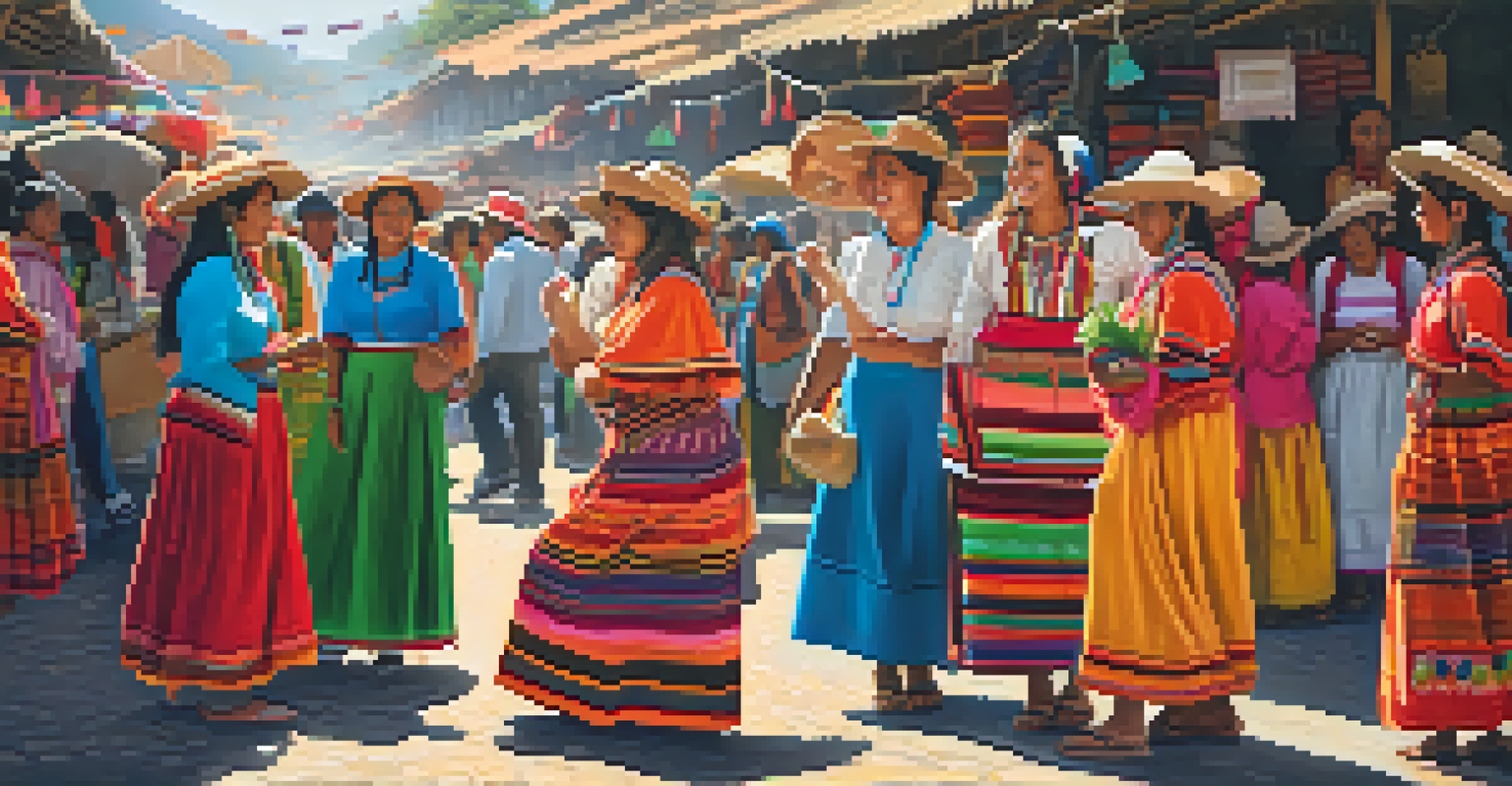Clorinda Matto de Turner: Pioneer of Peruvian Literature

Introduction to Clorinda Matto de Turner’s Life
Clorinda Matto de Turner was born on September 11, 1852, in Cusco, Peru. Growing up in a culturally rich environment, she was influenced by the indigenous heritage and the tumultuous political landscape of her country. Despite the challenges of her time, including gender norms that limited women's access to education, Matto de Turner pursued her passion for writing. Her determination and creativity made her a significant figure in Peruvian literature and beyond.
Literature is a powerful tool for social change, and it can raise awareness about injustices and inspire action.
Her life journey was marked by a desire to address social issues, particularly those affecting indigenous people and women. At a time when women were often relegated to domestic roles, Clorinda broke barriers by becoming one of the first female writers in Peru. She not only wrote novels but also utilized her platform to advocate for social change, making her a pioneer in every sense of the word.
Through her writing, Matto de Turner sought to uplift the voices of marginalized communities, which was revolutionary for her era. Her story is not just about literary achievements; it’s also about resilience and the courage to challenge societal norms. This foundation set the stage for her future works that would resonate with readers for generations.
Literary Contributions and Notable Works
Matto de Turner is best known for her novel 'Aves Sin Nido' ('Birds Without a Nest'), published in 1889. This groundbreaking work highlighted the struggles of indigenous people in Peru, shedding light on their oppression and the societal issues they faced. The novel's portrayal of these themes marked a significant shift in Peruvian literature, paving the way for discussions around social justice and equality.

Another significant work, 'El Dios de las Moscas' ('The God of Flies'), further delves into themes of morality and spirituality. This novel reflects her ability to weave complex characters and moral dilemmas, which made her storytelling both engaging and thought-provoking. Matto de Turner’s narratives often contained elements of realism, making her characters relatable and their struggles palpable.
Pioneer of Peruvian Literature
Clorinda Matto de Turner broke barriers as one of the first female writers in Peru, using her voice to advocate for social change.
Her commitment to exploring social issues through her writing made her a key figure in the development of modern literature in Peru. Matto de Turner not only entertained her readers but also encouraged them to reflect on the world around them. Her works continue to inspire new generations of writers and readers alike.
Advocacy for Indigenous Rights and Women’s Issues
Clorinda Matto de Turner’s literary career was deeply intertwined with her advocacy for social reform. She used her writings as a platform to discuss the plight of indigenous peoples, emphasizing their rights and dignity. Her passionate advocacy helped to raise awareness among her readers about the injustices faced by these communities, making her a voice for the voiceless.
The function of a writer is not to tell what we can all see, but to tell what we cannot see.
In addition to her focus on indigenous rights, Matto de Turner was also a staunch supporter of women’s rights. She challenged the traditional roles assigned to women in society, promoting the idea that women should have the right to education and independence. Her bold stance on these issues was particularly significant during a time when women were largely expected to remain silent.
Matto de Turner's writings often featured strong female protagonists who defied societal expectations, showcasing her belief in women’s empowerment. By intertwining her activism with her literary work, she created a legacy that not only entertained but also inspired change. Her contributions have had a lasting impact on both Peru’s literary landscape and the social movements that followed.
Cultural Impact on Peruvian Society
The influence of Clorinda Matto de Turner on Peruvian culture cannot be overstated. Through her literature, she helped to foster a greater understanding and appreciation for indigenous cultures among her readers. Her ability to articulate the struggles and joys of these communities has contributed to a richer cultural narrative in Peru.
Moreover, her works sparked conversations about identity and belonging, encouraging readers to reflect on their own cultural heritage. Matto de Turner’s exploration of these themes resonated with many, making her novels not just stories, but also important cultural commentaries. This has allowed her works to remain relevant in contemporary discussions about identity and social justice.
Advocate for Indigenous Rights
Matto de Turner championed the rights of indigenous people and women, intertwining her activism with her literary works.
Her legacy continues to inspire cultural movements that seek to honor and preserve indigenous traditions while advocating for equality. By bringing these issues to the forefront, Matto de Turner helped to shape the cultural landscape of Peru, leaving an indelible mark on its society.
Recognition and Legacy in Literature
Despite facing challenges as a female writer in a male-dominated society, Clorinda Matto de Turner’s contributions have been increasingly recognized. Today, she is celebrated as one of the foremost figures in Peruvian literature, with her works studied in schools and universities. Her unique perspective and storytelling have earned her a place among literary greats, both in Peru and abroad.
Literary awards and honors have been bestowed upon her posthumously, acknowledging her pioneering role in shaping Peruvian literature. Scholars continue to analyze her works, exploring their themes and cultural significance. This ongoing interest speaks to her timeless relevance and the impact she has had on literary discourse.
Moreover, Matto de Turner’s influence extends beyond literature; she has become a symbol of empowerment for women and indigenous rights activists. Her legacy serves as a reminder of the importance of using one’s voice to advocate for those who are marginalized. Clorinda Matto de Turner’s life and work inspire us to continue fighting for equality and justice.
Clorinda Matto de Turner’s Influence on Future Writers
Clorinda Matto de Turner paved the way for future generations of writers by demonstrating the power of literature as a tool for social change. Many contemporary Peruvian writers credit her for inspiring them to address social issues through their own narratives. Her fearless approach to tackling difficult subjects has encouraged others to follow in her footsteps.
Writers such as José María Arguedas and María Luisa Bombal have drawn from her legacy, crafting their own stories that explore themes of identity, culture, and the human experience. The impact of Matto de Turner’s work is evident in the way modern literature often reflects a blend of personal and societal struggles, much like her own narratives.
Influence on Future Writers
Her legacy has inspired countless contemporary writers to address social issues and explore themes of identity and culture.
Her influence is not confined to Peru; she has also inspired writers across Latin America and beyond. As discussions about gender equality and cultural representation continue to evolve, Matto de Turner’s pioneering spirit remains a guiding light for those who seek to make their voices heard through literature.
Conclusion: Celebrating Clorinda Matto de Turner
In conclusion, Clorinda Matto de Turner’s legacy as a pioneer of Peruvian literature is one that deserves celebration. Her remarkable journey as a writer and advocate has left an indelible mark on the literary and cultural landscape of Peru. By giving a voice to those who were often silenced, she not only transformed literature but also inspired social movements.
Matto de Turner’s works continue to resonate with readers today, reminding us of the importance of empathy, understanding, and the pursuit of justice. Her stories encourage us to reflect on our own roles in society and the impact we can have on others. As we remember her contributions, we are reminded of the power of storytelling to effect change.

As we celebrate Clorinda Matto de Turner, let us also honor the ongoing struggle for equality and representation in literature. Her life serves as a powerful testament to the idea that literature can be a catalyst for social change, and her legacy will continue to inspire future generations to raise their voices.